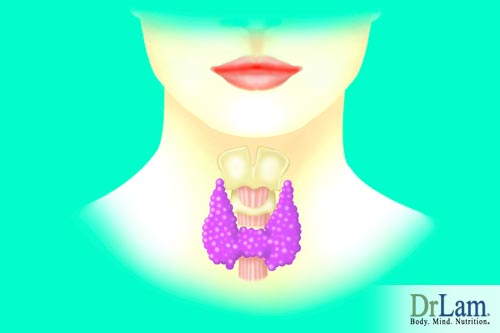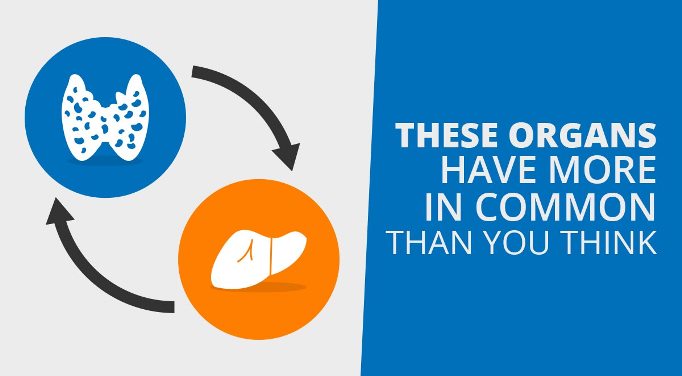 Before looking into thyroid dysfunction symptoms, you must first know how the thyroid is supposed to function. The thyroid is a small, butterfly-shaped gland situated toward the front of your neck and below the adam’s apple. Its purpose is to convert and manufacture two hormones, namely triiodothyronine (T3) and thyroxine (T4) which are then transported throughout the body to help with the metabolism process as well as energy production in your cells. This implies that they also play a role in the repair and growth of tissue, your cholesterol levels, your body heat, and cardiac rate.
Before looking into thyroid dysfunction symptoms, you must first know how the thyroid is supposed to function. The thyroid is a small, butterfly-shaped gland situated toward the front of your neck and below the adam’s apple. Its purpose is to convert and manufacture two hormones, namely triiodothyronine (T3) and thyroxine (T4) which are then transported throughout the body to help with the metabolism process as well as energy production in your cells. This implies that they also play a role in the repair and growth of tissue, your cholesterol levels, your body heat, and cardiac rate.
At times, however, there is an overproduction or underproduction of these hormones, in other words, your thyroid becomes dysfunctional, and this is usually identified by a number of symptoms.
Common thyroid dysfunction symptoms include feelings of low energy and/or constant fatigue, loss of hair, digestive problems, dry skin, depression, hands and feet that always feel cold, and even weight gain. Yet there are many people that have many or even all of these symptoms that, when clinically tested, show a negative result with regards to any thyroid dysfunction despite their symptoms. As a result, many have the individual symptoms treated, such as their depression, without the root cause of the problem being addressed.
Although these are all common thyroid dysfunction symptoms, they may be present due to imbalances in other parts of the body, and, in fact, have nothing to do with the thyroid at all! These symptoms are also seen when someone has adrenal fatigue (a condition whereby the adrenals are not able to produce sufficient anti-stress hormones to sustain your body, or when there is an imbalance in the brain, liver or even in the gut. It could also be the result of a combination of two or more of these particular problems.
Western medicine practitioners are trained to diagnose and then treat a specific condition based on symptoms. They tend to not look at the body as an entire organism, as is the case with those practicing natural, integrative, or functional medicine.
This means, in effect, that whereas someone may show certain thyroid dysfunction symptoms, and are treated for them specifically, it does not mean that the actual root cause for the problem is addressed all the time, or that the person with these conditions is getting the correct treatment to solve the underlying problem. Because the real reason behind these particular problems is not addressed, therefore, your body is not getting what it actually needs in order for it to rectify the particular problem or conjunction of symptoms that are presented.
Primary thyroid conditions are the direct result of the thyroid being dysfunctional and not producing hormones at their proper, optimum levels. This is usually easily identified and remedied by traditional western medicine. Alternative medicine works well in supplementing these conditions by means of focusing on addressing a person’s responsiveness, for example, with regards to the medication as it pertains to their depression, digestive problems, or even their constant weight gain.
 Secondary thyroid conditions refer to instances where the thyroid functions normally, but there is a dysfunction in a different part of the body that may be due to chronic stress, congestion, toxicity, or inflammation in some cases. This could result in the thyroid producing hormones at a level that is not optimal, giving rise to symptoms that are very similar to those of a dysfunctional thyroid. Conventional medicine will focus on pituitary and hypothalamic tumors, for example, as major reasons for secondary thyroid dysfunction.
Secondary thyroid conditions refer to instances where the thyroid functions normally, but there is a dysfunction in a different part of the body that may be due to chronic stress, congestion, toxicity, or inflammation in some cases. This could result in the thyroid producing hormones at a level that is not optimal, giving rise to symptoms that are very similar to those of a dysfunctional thyroid. Conventional medicine will focus on pituitary and hypothalamic tumors, for example, as major reasons for secondary thyroid dysfunction.
Medication that is prescribed for a thyroid that is not functioning correctly would therefore not alleviate thyroid dysfunction symptoms long term, as it does not address any of the underlying causes that led to the low thyroid function. There may be short term benefits in such cases.
Part of the neuroendocrine system is made up of the hypothalamic–pituitary–thyroid hormonal axis (HPT axis). The hypothalamus in the brain serves to detect when thyroid hormones are low and then secretes a hormone that indicates this to the pituitary so that it, in turn, secretes thyroid stimulating hormone(TSH) which, serves to stimulate the thyroid. The thyroid then releases hormones that once more stabilize your hormone levels.
Stress, as an example, could actually reduce the production of the thyroid stimulating hormone produced by the pituitary gland. It could also lead to reduced thyroid hormone availability to the cells. A more holistic approach to the problem is, therefore, necessary to identify the secondary causes of thyroid dysfunction.
Your adrenal glands are situated above the kidneys and produce, among many others, two specific hormones pertinent to this topic. Aldosterone aids in blood mineral level control and cortisol, which helps with the regulation of blood sugar in the human body. These glands were specifically designed in order to handle stress, but, due to our modern lifestyle, they tend to be subjected to constant stress, whether due to reasons of a physical or emotional nature. This tends to affect the adrenal glands negatively with regards to their functionality.
Cortisol levels can start to fluctuate, which then places a significant amount of stress on your metabolic pathways. To protect itself, the thyroid may slow down, and may become unresponsive to normal treatment with regards to the thyroid as the adrenal glands are not being addressed.
The liver, too, plays a role in proper thyroid function and its accompanying symptoms. Although the thyroid produces T4 and T3 hormones, cells are not able to use T4 hormones. The liver, in fact, is partly responsible for converting T4 into T3. If for some reason, the liver is not able to convert the T4 into T3, the body ends up with a shortage of the hormone it needs to ensure that it is able to function properly, resulting in not only a poorly functioning metabolism but with other conditions as well. This is often the case in adrenal fatigue as the body loses energy and the liver has to slow down to compensate for the lack of energy in the body.
The liver also has a binding function when it comes to thyroid hormones in that it produces thyroid binding globulin (TBG). Thyroid binding globulin are protein carriers that bind to thyroid hormones and allows them to be transported throughout the body. If, however, too much globulin is produced, the body will have a decrease in hormone availability to the cell, even though serum thyroid level may be normal or high.
While a blood test may not show that there is anything wrong, a dysfunction of any sort in the liver could, therefore, be inaccurately ascribed to a thyroid condition or thyroid dysfunction symptoms.
 Natural medicine’s viewpoint is to regard a body’s entire stress response from a neuroendometabolic (NEM) standpoint, i.e. one that is comprised of various chemical reactions, pathways, organs and systems which all work cohesively in order to combat stress.
Natural medicine’s viewpoint is to regard a body’s entire stress response from a neuroendometabolic (NEM) standpoint, i.e. one that is comprised of various chemical reactions, pathways, organs and systems which all work cohesively in order to combat stress.
The adrenal glands are part of the NEM stress response. As the adrenals are put under more and more pressure to perform optimally, they are eventually unable to produce sufficient quantities of cortisol in order to meet the demand. Clinically speaking, fatigue is accompanied by an initial rise in cortisol and hormone levels, and then a subsequent fall. The result is what is commonly referred to as adrenal fatigue.
Adrenal fatigue is characterized by four stages, and when a body advances to either stage three or stage four, further complications affecting other organs in the body are usually noted, such as developing a hypersensitivity with regards to certain medications due to a sluggish liver, their libido is lowered due to dysregulated reproductive organs, and anxiety and possibly panic attacks arise from an overactive autonomic nervous system. Although tests may find no physiologic reason for this state, those with the condition are often incapacitated and not able to continue their normal lifestyle.
As adrenal gland disorders are commonly mistaken for thyroid problems. It is important to take a look at your entire metabolic system before identifying the cause and the solution to the problem. It should be clear now that every system in your body is connected to each other. The adrenals to the thyroid, the thyroid to the liver. A weakness in one organ will affect the others, like a domino effect. The importance of looking at stress then from a holistic and NEM approach is thus very important. And just as your symptoms did not develop overnight, complete recovery will also not occur overnight.
© Copyright 2017 Michael Lam, M.D. All Rights Reserved.

